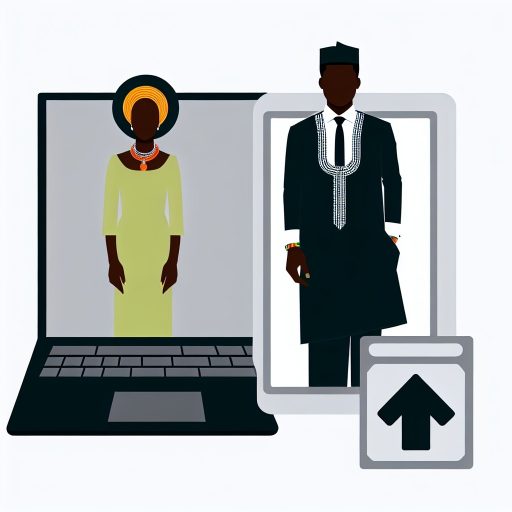Introduction to Curriculum Design in Nigeria’s Education Sector
Curriculum design plays a vital role in shaping education in Nigeria.
It determines the content, skills, and insights students receive.
This area impacts teaching methodologies and assessment strategies as well.
For effective curriculum design, various stakeholders must collaborate.
Key players include educators, government agencies, and experts.
Importance of Curriculum Designers
Curriculum designers are essential for enhancing educational quality.
They ensure that learning materials meet both national and global standards.
Additionally, they facilitate the integration of technology into learning processes.
This support fosters innovation in teaching methods.
Current Challenges in Curriculum Design
Nigeria’s education system faces several challenges in curriculum design.
One significant issue is the alignment of curriculum with industry demands.
Moreover, inadequate resources often hinder effective implementation.
Another challenge is the resistance to change among some educators.
The Role of Government in Curriculum Design
The Nigerian government plays a crucial role in curriculum development.
It sets the educational framework and policies guiding curriculum design.
Furthermore, government bodies evaluate and approve new curriculums.
This process ensures that education remains relevant and effective.
Collaboration with Educational Institutions
Collaboration among educational institutions enhances curriculum design.
Universities and colleges contribute expertise and research-based insights.
These partnerships facilitate the sharing of best practices.
Moreover, they provide networking opportunities for curriculum designers.
Future Directions for Curriculum Design
Looking ahead, curriculum design must adapt to changing needs.
Incorporating global perspectives into local curriculums is critical.
Additionally, ongoing professional development for educators is essential.
This focus ensures that teaching practices evolve alongside curriculums.
The Importance of Curriculum Designers in Educational Outcomes
Enhancing Educational Quality
Curriculum designers play a crucial role in shaping educational quality.
They ensure that learning materials align with academic standards.
Furthermore, these professionals adapt curricula to meet diverse learning needs.
Bridging Gaps in Learning
Effective curriculum design addresses gaps in student learning.
Designers analyze assessment data to identify areas for improvement.
By doing so, they create targeted programs to enhance student performance.
Incorporating Modern Technology
Technology integration is vital for today’s educational environments.
Curriculum designers incorporate digital tools into lesson plans.
This approach promotes engagement and fosters interactive learning.
Collaboration with Educators
Collaboration with teachers is essential for effective curriculum design.
Designers gather feedback from educators to refine materials.
This partnership ensures that curricula reflect classroom realities.
Supporting Lifelong Learning
Curriculum designers promote lifelong learning opportunities.
They create frameworks that encourage continuous skill development.
Moreover, their work prepares students for future challenges.
Key Responsibilities of Curriculum Designers in Nigerian Schools
Curriculum Development
Curriculum designers create and develop educational programs.
They ensure the curriculum aligns with national educational standards.
Furthermore, they integrate modern teaching methods into the curriculum.
Assessment and Evaluation
They design assessment tools to measure student learning outcomes.
This includes creating tests, quizzes, and performance tasks.
Additionally, they analyze assessment data to improve curriculum effectiveness.
Collaboration with Educators
Curriculum designers collaborate with teachers to gather insights.
They seek input on curriculum effectiveness in the classroom.
Moreover, they provide training and support to educators on new materials.
Research and Innovation
They conduct research on educational trends and best practices.
This helps them design relevant and engaging curricula.
They also explore technology integration to enhance learning experiences.
Community Engagement
Curriculum designers engage with parents and the community.
They seek feedback to align curricula with community values and needs.
Additionally, they organize workshops to educate stakeholders about curriculum changes.
You Might Also Like: How Special Education Teachers Are Making a Difference in Nigeria
The Process of Developing and Implementing Curriculum in Nigeria
Initial Assessment and Planning
Curriculum development begins with a thorough assessment of educational needs.
Stakeholders conduct surveys to gather relevant data.
Furthermore, institutions analyze existing curricula to identify gaps.
Afterwards, a planning committee is formed to outline objectives.
This committee includes experienced educators and curriculum designers.
Curriculum Design and Development
During the design phase, educators generate content that aligns with national standards.
They create learning objectives that cater to diverse learner needs.
This process includes drafting instructional materials and assessment tools.
Subsequently, reviews ensure all materials meet educational criteria.
Implementation Strategies
The implementation phase focuses on training educators.
Workshops help teachers understand the curriculum’s intent and methods.
Moreover, schools are equipped with necessary resources like textbooks and technology.
Administrators monitor the rollout to quickly address challenges.
Evaluation and Continuous Improvement
Evaluation takes place after implementation to assess curriculum effectiveness.
Feedback is gathered from teachers, students, and parents.
This feedback informs necessary adjustments to improve the curriculum.
Moreover, periodic reviews ensure that the curriculum stays relevant.
Uncover the Details: Why Becoming a Secondary School Principal is a Top Career Choice in Nigeria
Challenges Faced by Curriculum Designers in Nigeria
Limited Resources
Many curriculum designers in Nigeria encounter limited resources for effective curriculum development.
This deficit affects the quality of educational materials produced.
Furthermore, inadequate funding restricts access to necessary technology.
Consequently, designers must often rely on outdated information and methodologies.
Insufficient Training Opportunities
Another challenge is the lack of ongoing professional development for curriculum designers.
Many designers do not have updated training in modern pedagogical techniques.
This gap limits their ability to create innovative and effective curricula.
In addition, workshops and seminars are not readily available in many regions.
Stakeholder Pressure
Curriculum designers face significant pressure from various stakeholders.
Parents, teachers, and government officials often demand immediate results.
Such pressure can lead to hasty decisions that compromise quality.
In turn, this creates a cycle of dissatisfaction among stakeholders.
Inflexible Educational Policies
Strict government regulations often limit the creativity of curriculum designers.
Publish Your Professional Profile, Business or Brand
Showcase your expertise, gain trust, and boost visibility instantly on Professions.ng.
Publish NowThese inflexible policies can hinder the adaptation of curricula to local contexts.
Additionally, national standards may not consider regional cultural differences.
This lack of flexibility inhibits meaningful engagement with diverse learners.
Changing Educational Needs
Rapid technological changes create new demands for skill development.
Curriculum designers must continuously adapt to these evolving needs.
However, staying current requires substantial time and effort.
Moreover, aligning curricula with market demands can be challenging.
Lack of Collaboration
Collaboration among stakeholders is often lacking in Nigeria’s education sector.
This absence of cooperation can lead to duplicated efforts and wasted resources.
Furthermore, without collaboration, best practices are not shared effectively.
This results in missed opportunities for improving curriculum quality.
See Related Content: Why Early Childhood Education is a Growing Career in Nigeria

Collaboration with Educators and Stakeholders in Curriculum Development
The Importance of Collaboration
Collaboration is crucial for effective curriculum development in Nigeria.
It brings diverse perspectives to the table.
Educators and stakeholders contribute their unique expertise.
As a result, the curriculum addresses local and national needs.
Engaging Educators in the Process
Educators play a vital role in curriculum design.
They provide insights from classroom experiences.
Their feedback helps to shape relevant content.
Furthermore, educators ensure that the curriculum remains practical.
Workshops and Focus Groups
Organizing workshops fosters collaboration among educators.
These sessions allow for open discussions about curriculum challenges.
Focus groups can also highlight areas needing improvement.
Involving Stakeholders
Stakeholder involvement enriches the curriculum development process.
Parents, community leaders, and businesses provide additional insights.
These stakeholders bring real-world relevance to educational content.
This helps prepare students for the job market and society.
Building Networks
Creating networks among stakeholders enhances collaboration.
Regular meetings ensure ongoing dialogue and feedback.
These networks can also facilitate resource sharing.
Utilizing Research and Data
Data-driven approaches improve curriculum effectiveness.
Analyzing educational research guides curriculum decisions.
Collaboration with research institutions can foster innovation.
This allows curriculum designers to stay current with trends.
Feedback Loops
Establishing feedback loops is essential for continuous improvement.
Regular evaluations help identify gaps and successes.
This responsive approach ensures the curriculum remains relevant.
Discover More: Why Becoming a Special Education Teacher is One of the Most Rewarding Professions in Nigeria
The Role of Technology in Modern Curriculum Design
Integration of Digital Tools
Curriculum designers utilize various digital tools in education.
They enhance learning experiences using multimedia resources.
Additionally, they incorporate online platforms for collaboration.
These tools facilitate instant feedback and assessment.
Moreover, technology helps tailor learning to individual needs.
Access to Educational Resources
Technology expands access to a multitude of resources.
Students access e-books, articles, and videos with ease.
Furthermore, curriculum designers curate online content efficiently.
This approach ensures that learned materials are relevant and up-to-date.
Promoting Interactive Learning
Modern curriculum design emphasizes interactive learning methods.
Technologies like simulations and virtual environments play a crucial role.
Moreover, these methods engage students profoundly in the material.
Collaboration tools enhance group work and problem-solving skills.
Data-Driven Decision Making
Technology aids curriculum designers in making informed decisions.
Data analytics provide insights into student performance and needs.
Subsequently, designers can modify curricula based on these insights.
This adaptability is essential for addressing emerging educational trends.
Supporting Professional Development
Technology also supports the professional development of educators.
Online training programs keep teachers updated on new methodologies.
Webinars and forums facilitate knowledge exchange among educators.
As a result, teachers enhance their skills and teaching strategies.
Future Trends and Innovations in Curriculum Design in Nigeria
Integration of Technology
Technology plays a crucial role in modernizing the curriculum.
Schools increasingly adopt digital tools in classrooms.
Interactive learning platforms enhance student engagement.
Moreover, e-learning solutions expand access to education.
Curriculum designers focus on creating tech-integrated programs.
This innovation fosters a more dynamic learning environment.
Emphasis on Skill Development
The future curriculum prioritizes practical skills alongside theoretical knowledge.
It aims to prepare students for real-world challenges.
Employers seek graduates with critical thinking and problem-solving abilities.
As a result, programs are being designed to include vocational training.
This shift supports the national goal of reducing youth unemployment.
Inclusivity and Diversity
Curriculum designers emphasize inclusivity across educational materials.
Diverse perspectives are incorporated into learning resources.
This approach supports students from various cultural backgrounds.
Additionally, it promotes mutual respect and understanding among learners.
Inclusive education helps nurture a sense of belonging in the classroom.
Collaboration with Industry Experts
Collaboration with industry professionals shapes curriculum relevance.
Curriculum designers engage experts to provide input on essential skills.
This partnership helps align education with workforce needs.
Moreover, it ensures that students receive field-relevant training.
Networking events between educators and industries strengthen these ties.
Sustainability Education
Sustainability becomes a key focus in curriculum design.
Programs educate students about environmental responsibility.
This awareness promotes sustainable practices from an early age.
Furthermore, schools integrate project-based learning around sustainability themes.
This approach encourages innovation and critical thinking in problem-solving.
Continuous Professional Development for Educators
Teachers receive ongoing training to adapt to new curriculum trends.
Professional development programs enhance educators’ effectiveness.
Publish Your Professional Profile, Business or Brand
Showcase your expertise, gain trust, and boost visibility instantly on Professions.ng.
Publish NowWorkshops and seminars help them stay updated with best practices.
Additionally, collaboration among teachers fosters shared learning experiences.
Empowering educators ultimately benefits student learning outcomes.
Additional Resources
Steven Loya on LinkedIn: #educationreform #vocationaltraining …
Anatomy Education in Nigeria: A Study of Program Curricula Toward …




